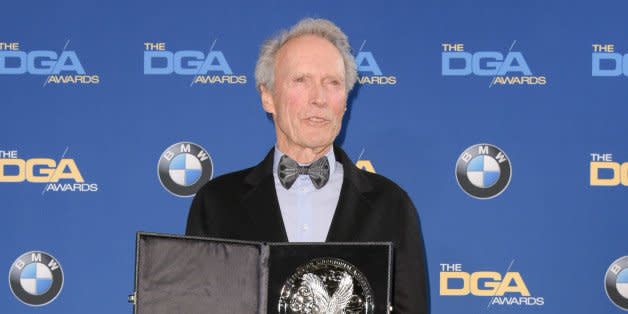Clint Eastwood Says He And 'American Sniper' Are 'Anti-War'

After fierce debate over whether "American Sniper" glorifies war, Clint Eastwood has said he sees the film -- and himself -- as "anti-war."
Speaking to students at Loyola Marymount University School of Film and Television in Los Angeles last week, Eastwood described "American Sniper," which became 2014's highest-grossing film and collected a Best Picture nomination, thusly: “I think it’s nice for veterans, because it shows what they go through, and that life -- and the wives and families of veterans. It has a great indication of the stresses they are under. And I think that all adds up to kind of an anti-war [message].”
Eastwood admitted the film "glorifies" the sniping that its true-life subject, Chris Kyle, did during his tours in Iraq, but he said Kyle's actions are qualified by regrets. "And that’s just the way it is," he said. "I think it’s anti. It just depends on how you want to look at it.”
Eastwood's remarks arrive about two months after "American Sniper" proved divisive. Rolling Stone's Matt Taibbi called its politics "ludicrous and idiotic," while others pointed out the omission of certain damning biographical details surrounding Kyle and flat-out called it "war propaganda." On the other hand, many pinpointed the murkiness of dissecting the movie's politics and countered these criticisms by refuting its supposed pro-war stances.
Love HuffPost? Become a founding member of HuffPost Plus today.
Seen as a Republican poster boy after addressing a chair where an invisible President Barack Obama supposedly sat at the 2012 national convention, Eastwood said last week that he, too, is anti-war.
"I was not a big fan of going to war in Iraq or Afghanistan for several reasons, several practical reasons," he said. "The British had never been successful [in Afghanistan], the Russians had 10 years there and hadn’t been successful and so we think we’re going to go over there and we can't even fly in directly and we’re going to ... you know, it has to have some thought process added into it. Iraq, I know was a different deal because there was a lot of intelligence that told us that bad things could happen there and we’re never sure how that ended up whether it was pro or con or no, I tend to err on the side of less is best."
Head to The Hollywood Reporter to read Eastwood's full transcript from Loyola Marymount.
This article originally appeared on HuffPost.
